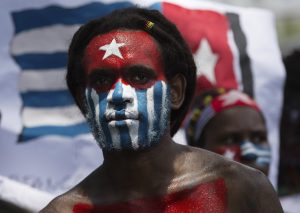Separatist rebels in Papua say that they are ready to release a New Zealand pilot, a year to the day after taking him hostage in a remote part of the restive region of eastern Indonesia.
Philip Mehrtens was abducted by independence fighters on February 7, 2023, shortly after his single-engine plane touched down at an airstrip in the district of Nduga, in the Papuan highlands. The abduction was reportedly carried out by an armed faction of the West Papua National Liberation Army (TPNPB) led by Egianus Kogoya, who said that it would release Mehrtens until the Indonesian government acknowledged Papua’s independence.
Terianus Satto, a leader of the Free Papua Movement’s armed wing, said in a statement yesterday that the TPNPB was willing to let Mehrtens go and expected the United Nations to facilitate his release.
“In order to protect humanity and ensure human rights, the management of the national command headquarters of the West Papua Liberation Army will return Philip Mark Mehrtens to his family,” the statement said. Satto did not give a time frame for a possible handover.
The statement added that Mehrtens was being treated well, and was in good health. In December, the TPNPB released a video of the pilot, in which he asked his family to send him an e-book reader and several Ventolin inhalers for his asthma.
Papua has been home to a separatist insurgency since the region was absorbed by Indonesia after what independence activists say was a flawed U.N. referendum in 1969. But the conflict has worsened considerably since 2018, as the Indonesian state has extended infrastructure and transport links into the heart of highland Papua. This has inflamed resistance, prompting more sophisticated and successful attacks by TPNPB and other pro-independence groups. Even so, Mehrtens’ abduction is just the second that the TPNPB has committed since 1996.
Over the past year, the Indonesian military has made several unsuccessful attempts to rescue Mehrtens. At the same time, it quickly became clear that the rebels’ demand was unrealistic and that the Indonesian government had no intention of altering its hardline position on Papuan independence – a factor that might explain the TPNPB’s announcement.
A report by Reuters quoted TPNPB spokesperson Sebby Sambom as saying that an order for the pilot’s release had been issued, and that a team would be dispatched to communicate the order to Kogoya, who will face a court martial if he does not comply.
This seems strongly to imply disagreement within the TPNPB about what to do with Mehrtens. This is not surprising, given the highly factionalized and geographically dispersed nature of the TPNPB, but it also raises the possibility that Kogoya will simply refuse to obey orders. It is also likely that any release will be preceded by long negotiations. As one observer noted on X (formerly Twitter), any suggestion that the U.N. be involved in the handover of Mehrtens will likely be rejected out of hand by Jakarta, which has long been suspicious of giving U.N. officials access to the Papuan region.
The statement came on the same day that New Zealand’s government called publicly for the immediate release of the pilot. Foreign Minister Winston Peters said in a statement that Mehrtens had been providing “vital air links and supplies to remote communities” at the time that he was abducted.
“We strongly urge those holding Phillip to release him immediately and without harm,” Peters said. “His continued detention serves the interests of no one.”
He and Indonesian Foreign Minister Retno Marsudi discussed the pilot’s case in a phone call yesterday. According to the Indonesian Foreign Ministry’s spokesperson Lalu Muhammad Iqbal, Marsudi told Peters that Indonesia continues to make efforts to free the hostage “by prioritizing persuasive aspects and approaches.”
































